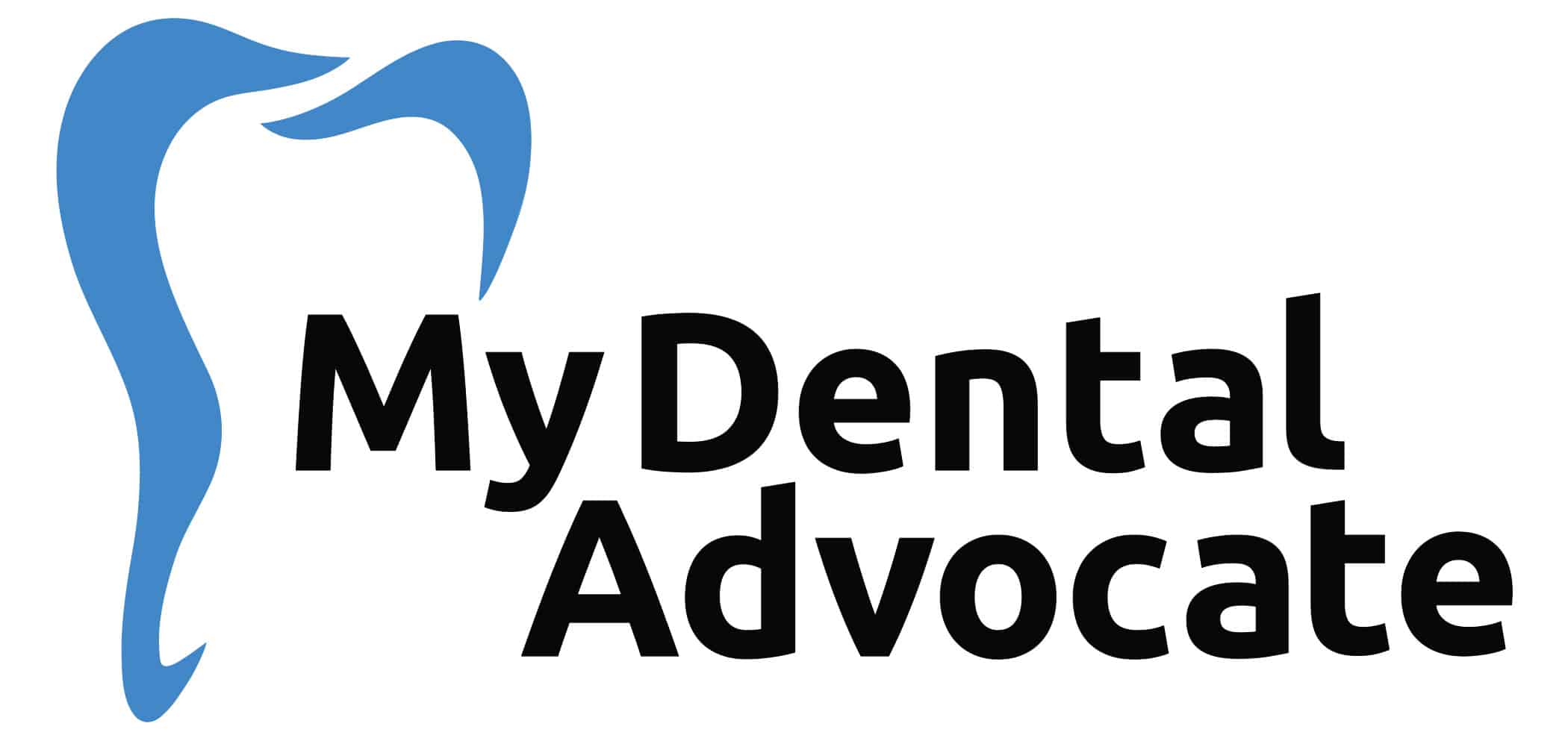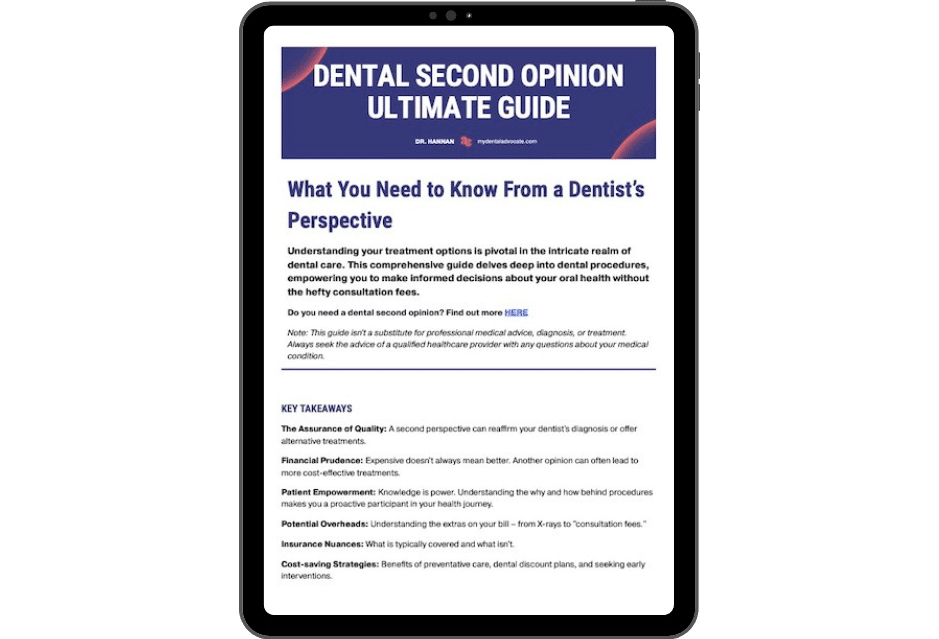10 Reasons You Need a Second Opinion on Dental Work (Dentist’s Thoughts)
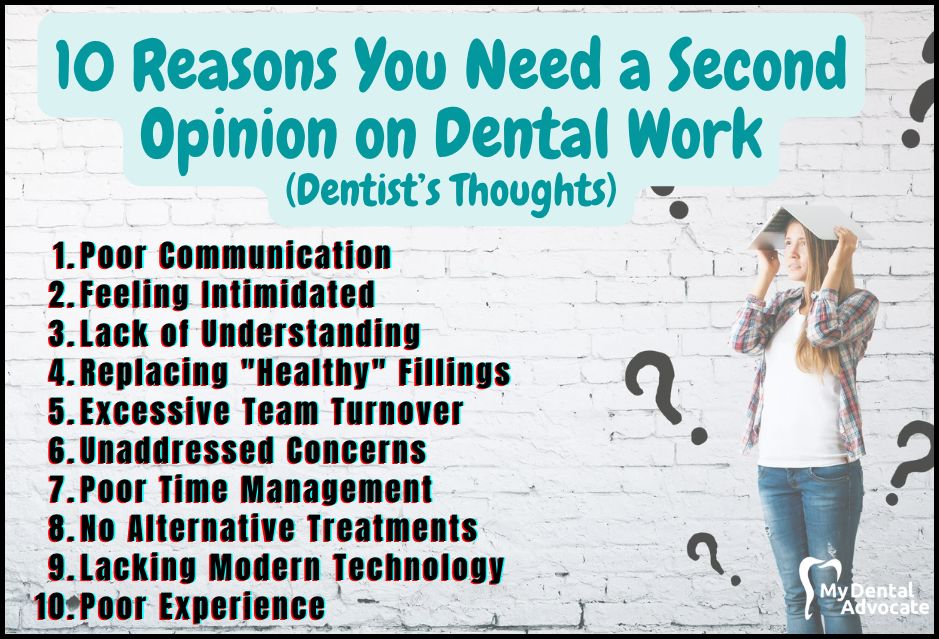
When was the last time you went to the dentist?
Maybe you haven’t gone back because you thought you could brush and floss at home.
Then, the dentist informs you that you need thousands of dollars in dental work. Talk about deflating! Where do you go from here?
As a dentist, I’ll share when and why a second opinion is necessary to receive the best dental care. In addition, I’ll explain how My Dental Advocate can help ease your dental treatment concerns.
Need Dental Advice? Ask Dr. Hannan!
Do You Trust Your Dentist?
Trust is essential between you and your dentist.
Unfortunately, it takes years for many to solidify trust and rapport with their dentist. As a dentist, I understand the importance of treating patients with honest and healthy intentions, as you would treat family.
Unfortunately, a few bad actors take advantage of others in every industry.
For example, receiving dental care is similar to taking your car to the shop. After the technician examines your vehicle, they explain the problems and recommend solutions.
Without car knowledge, you accept the technician’s word for it before agreeing to thousands of dollars of repair. Dentistry is no different.
Most people have limited dental expertise on which to base their decisions. In addition, if the dentist cannot show you the problem via a picture or x-ray, you take their word for it.
My desire is not to smear dentistry or throw any clinician under the bus.
It’s quite the opposite, as it’s crucial to collaborate with fellow clinicians and discuss best practices to serve your community well. With that being said, when is it necessary to get a second opinion on dental work?
When to Get a Second Opinion on Dental Work (10 Reasons)
If you are visiting the dentist for the first time in years or are shocked to learn you need extensive treatment after years of health, it’s essential to understand when a second opinion on dental work is necessary.
1. Poor Communication
Does your dentist communicate with you about the necessary treatment and why?
There’s no reason you should be unable to visualize the problem or concern with technological advancement.
For example, dental x-rays have transitioned to digital x-rays for decreased radiation, instant imaging and ease of use.
In addition, intraoral cameras are available to snap high-definition images to visualize cracks, tooth decay, gum inflammation or any other dental concern. Do you feel rushed or welcome to talk about findings?
The dentist should be available and facilitate any questions or concerns about the proposed dental treatment.
Asking questions is essential to bridge the gap between confusion and clarity.

2. Feeling Intimidated
How does the dental team treat you?
Do they judge you if you have poor oral health? I’ve encountered many patients who felt intimidated and harassed during previous dental appointments.
There’s no room for condescending comments and negativity.
The dentist and supporting dental team should have every intention of caring for your oral health in a non-judgemental way.
Recommended Reading: Dental Crown Second Opinion (Potentially Save Thousands)3. Lack of Understanding
Do you know how much your treatment costs?
How much does your insurance cover? What is the difference between crowns and veneers?
Are you aware of the benefits of sealants versus fluoride treatments? These are just some things you may not know about dental procedures.
Therefore, educating yourself on these topics before undergoing any procedure is essential.
However, if you have questions about your dental treatment, the dentist should be able to explain why it’s needed clearly.
In addition, with technological advancements, the dentist should be able to show you the dental problem.
4. Replacing “Healthy” Fillings
Does the dentist want to replace your silver fillings simply because they are “old?”
Silver fillings, also known as amalgam fillings, can last for 30+ years. Replacing healthy fillings is unnecessary if they’re not causing problems and there are no signs of failure.
Of course, older fillings can crack, chip, or otherwise deteriorate. However, a dentist should be capable of presenting intra-oral photos and radiographs to demonstrate the necessity for filling replacements.
For example, silver fillings are prone to act as a wedge over time, causing cracks in the tooth that require further treatment.
In addition, white and silver fillings expand and shrink with changes in temperature leading to “leakage.”
Filling leakage refers to cavity-causing bacteria localizing under a dental filling, potentially leading to replacement and further dental treatment.
Some people fear mercury in silver-colored (amalgam) fillings.
However, the American Dental Association (ADA) states in their popular informative guide to dental health, MouthHealthy, that countless research studies affirm dental amalgam is safe and effective for filling cavities.
According to research, dental amalgam forms a safe, stable filling material when combined with other metals.
5. Excessive Team Turnover
Hiring in the dental industry is especially difficult.
Dental assistants are desperately needed in many practices across the country.
However, it may be a red flag if your dental practice experiences excessive dental team turnover. Are great team members leaving? How do the other team members speak about that person?
High team turnover may indicate a poor workplace environment that could trickle into compromised patient care.
6. Unaddressed Concerns
Have you visited the dentist with a primary concern only to have it unaddressed?
In my experience, this is a common reason people look elsewhere for dental care. Trust is compromised if the dentist cannot listen to the patient’s chief complaints and address them promptly.
In addition, if your present with a chipped tooth but proposed Invisalign treatment, this is a red flag.
You may need Invisalign treatment, but not when your primary concern is a chipped tooth. You expect the dentist to address your concern before moving on to other recommendations.
7. Poor Time Management
Are you waiting in the waiting room for an extended period?
Or are you waiting for the doctor for what seems like an eternity? Poor time management comes across as not caring about the patient’s precious time. Dental appointments can be 2+ hours long. That’s a long time!
Is the office overbooking and not considering the patient time?
Understanding why they are delayed will help ease concerns. For example, the dentist may be tied up treating a dental emergency that requires immediate attention.
Consider how timely your appointment is and if the dental team is efficient with their time.
8. No Alternative Treatments
Is your dentist giving you more than one option?
There certainly are times when only one option is available. However, there are multiple treatment options the majority of the time.
Discuss the treatment alternatives with your dentist to fully understand the proposed treatment.
For example, perhaps implants are the best option for you.
But if you cannot pay for them, another option may be fixed bridges or partial dentures.
Spending extra money for a second or even third dentist appointment might be worthwhile to get an additional perspective on whether you’re receiving the best care.
Recommended Reading: Online Dental Second Opinion (Synchronous vs. Asynchronous Telehealth)9. Lacking Modern Technology
Dental technology has dramatically advanced over the years.
Did you know you can have same-day crowns? Dental crowns can be prepared, fabricated and delivered within 2 hours.
That’s mind-blowing. Dental practices lacking modern technology are not a deal-breaker; however, you may question their dental skills.
For example, are their dental skills up-to-date?
If they don’t upgrade their equipment, does it mean they don’t care about their dental treatment? Technology improvements such as digital x-rays are critical to minimize dental radiation exposure.
10. Poor Experience
How do you feel when you see a dental hygienist?
Does she seem happy to be there? Is she smiling or frowning?
Most people would rather be at home than the dentist; I don’t blame them.
Who wants to take off work and pay money to have a shot in your gums before listening to a noisy handpiece cut away at your tooth?
Although the dental office is scary, many clinicians and team members work hard to provide a comfortable and welcoming environment.
In addition, the clinician will be careful to ensure you don’t feel pain during the procedure.
If your dental experience is different, it may be necessary to get a second opinion and visit another dental practice.
Recommended Reading: 5 Benefits of a Dental Second Opinion (Dentist’s Perspective)Finding a Dentist for a Second Opinion
Talking to your dentist before getting a second (or third) professional’s advice might be helpful if you want to avoid a potential misalignment between you and them.
For example, if a dentist suggests something outside your budget, ask if there’s another solution.
Or discuss payment options over an extended period. If there’s no other option, it may be time to find a second opinion.
According to a 2011 Journal of Marketing Research study, patients are unlikely to challenge a dentist they’ve seen for many years.
However, according to the American Dental Association (ADA), American Academy of Pediatric Dentistry (AAPD) and the American Association of Oral and Maxillofacial Surgeons (AAOMS), if you’re uncertain about your dental treatment, seek a second opinion.
Legally, you can view, review and request copies of your dental x-rays, pertinent notes, and other dental records.
However, if you want a second opinion from a different dentist, they may want to take their x-rays for verification.
Most dentists will not charge you if re-taking them is necessary.
An honest and ethical dentist will not discourage you from getting a second opinion; they might even suggest it.
MDA Verification Report
What is the My Dental Verification Report, and why is it important?
Our board-certified dentists will review your case and provide an unbiased second opinion on how you should move forward with your proposed dental treatment.
We respect all dentists suggested treatment; however, we desire clarity for your dental needs.
You should understand what dental work is necessary to move forward with treatment confidently.

How We Help
- Avoid unnecessary dental treatment
- Potentially save you thousands of dollars
- Information reviewed privately and securely
- Unbiased assessment that brings you peace of mind
- Quick response time to review the report at your convenience
- Clarity and confidence moving forward with dental treatment
- Completed from the comfort of your own home
What’s Involved?
With My Dental Advocate, patients of all ages now have an unbiased, expert second opinion to securely review their proposed dental treatment and learn to improve their oral health.
Step 1: Complete Questionnaire
The questionnaire includes a brief medical history, oral hygiene habits, and an opportunity to explain your dental concerns.
Step 2: Upload X-rays
Contact your provider to request your x-rays or take a photo of them at the office. You can also upload dental photos, current treatment plans, periodontal probings, and other supporting documents.
Step 3: Submit Payment
We will privately send your information to a board-certified dentist who will securely assess your case and provide a detailed second opinion for your proposed dental work.
Step 4: Receive MDA Verification Report
We will email your MDA Verification Report second opinion within hours for review at your convenience and from the comfort of your home.
Frequently Asked Questions (FAQ)
My Experience & Expertise
Seeking a dental second opinion is important in ensuring that you receive the best care for your oral health.
By consulting with another dentist, you can gain a fresh perspective on your treatment options and potentially uncover new information that may impact your decision.
It is always better to be safe than sorry about your dental health, so don’t hesitate to seek a second opinion if you have any doubts or concerns.
Always remember to research, choose a reputable dentist for your second opinion, and never be afraid to ask questions or voice your concerns. Your oral health is important, and getting a second opinion can help you make informed decisions about your treatment.
Need a second opinion? We can help! Learn more. Knowledge is power when cultivating healthy dental habits. The more informed you are, the better positioned you’ll be to prevent avoidable and potentially costly dental procedures for you and your family. Watch for future blog posts, where we’ll continue sharing important information, product reviews and practical advice!
Sources
- Feder S. The Paper Gown. Zocdoc, 2021.
- Watson S. Should you seek a second opinion for dental work? Verywell health, 2021.

About the Author
Dr. Matthew Hannan, also known as “Dr. Advocate,” is a board-certified dentist on a mission to provide accurate dental patient education. He attended Baylor University before completing dental school at UT Health San Antonio School of Dentistry. He now lives in Arizona with his beautiful wife and 4 kids. Dr. Hannan believes everyone should access easy-to-read dental resources with relevant, up-to-date dental research and insight to improve their oral health.

Connect with Dr. Hannan!
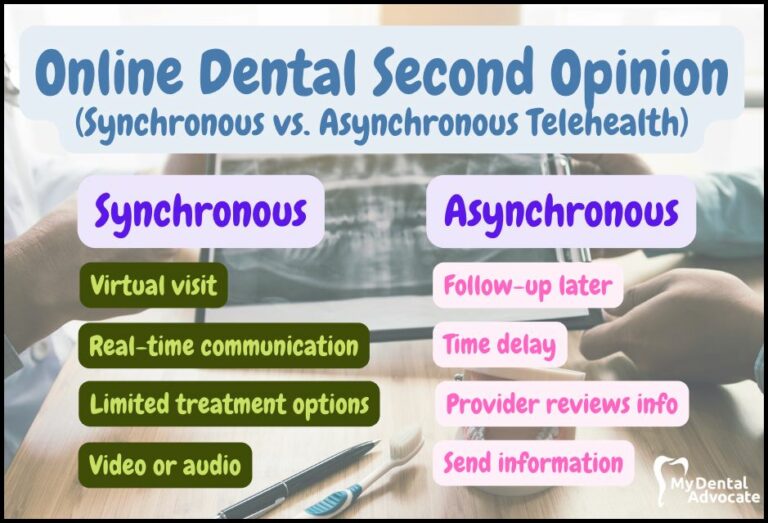
Online Dental Second Opinion (Simple & Easy Solution)
My Dental Advocate is the perfect solution to review your proposed dental treatment and x-rays without visiting another dentist. Our board-certified dentists will provide a non-biased report to give you peace of mind…
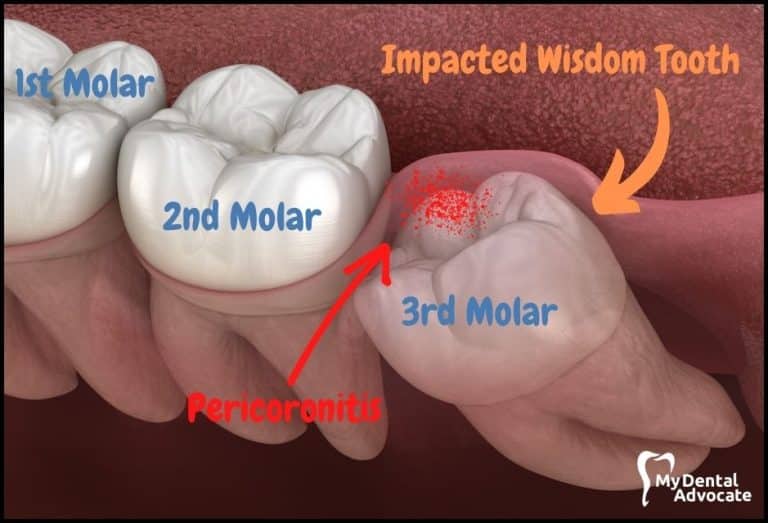
Impacted Wisdom Teeth (How to Manage Symptoms)
Are you suffering from impacted wisdom teeth? If yes, then you should read this article. This condition is quite common and affects millions of people worldwide. Around 90% of us have at least one impacted wisdom tooth…
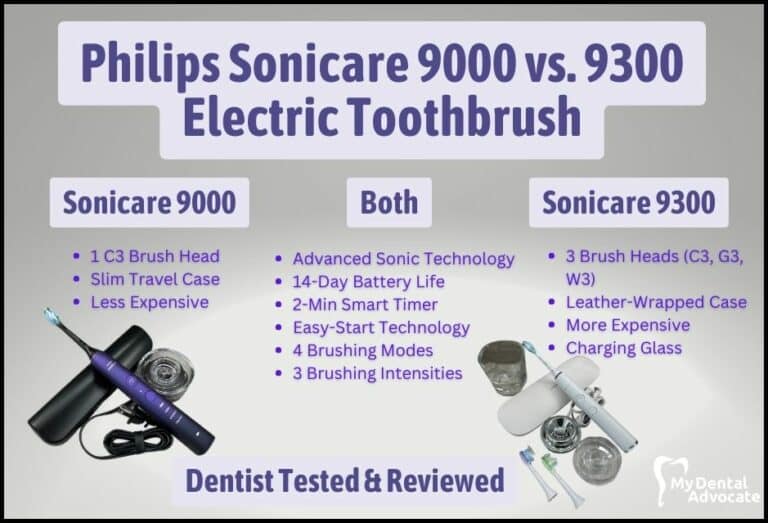
Philips Sonicare 9000 vs. 9300 Electric Toothbrush Review 2024
As a dentist with years of experience advocating for optimal oral health, I understand that the tools you use at home can make a significant impact on your dental well-being. Electric toothbrushes have become increasingly popular due to their efficacy and ease of use. But how do you choose the right one? Two standout models in my practice that have garnered attention are the Philips Sonicare 9000 and 9300 Electric Toothbrush.
Gain Clarity with Our FREE Second Opinion Guide
Receive clear, expert second opinions online within 48 hours. Start today!
Product Reviews
Our 250+ dental product reviews (and counting), curated by an experienced dentist, are the most comprehensive online.
Toothbrush Genie
State-of-the-art chatbot designed to help you discover your perfect toothbrush in just a few simple steps!
Cavity Risk Assessment
Cutting-edge digital tool designed to evaluate your individual cavity risk based on your responses to a series of questions.
Gum Disease Assessment
Discover your gum disease risk with our quick and engaging 6-question assessment!
